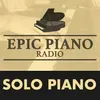Low german Live Radio Stations
Radio Stations
- CHOPIN by Epic Piano

- De Stemm Radio

- ElectricfabricElectricfabric
- GRIEG by Epic Piano

- L1 Plat-eweg

- MODERN PIANO by Epic Piano

- Radio Ostfriesland Bürgerradio

- Radio RegentrudeRadio Regentrude
- SOLO PIANO by Epic Piano

- stadlpowerradio82stadlpowerradio82
- SW-Radio PlautdietschSW-Radio Plautdietsch
- TSCHAIKOWSKI by Epic Piano

Choose a Language
Low German, also known as Plattdeutsch or Niederdeutsch, is a regional language spoken by millions of people primarily in northern Germany, the Netherlands, and parts of Denmark. It is a member of the West Germanic family of languages and is closely related to the Dutch and Frisian languages.
Radio stations that broadcast in Low German serve as an important platform for preserving and promoting this unique language and culture. These stations cater to a diverse range of listeners, from those who grew up speaking Low German as their first language to those who are interested in learning more about the language and culture.
Some of the topics covered by Low German radio stations include news, current events, cultural programs, music, and entertainment. They also offer a range of educational content, including language lessons, historical documentaries, and interviews with local experts and personalities.
One of the main advantages of Low German radio stations is their ability to connect listeners from different regions and countries. Many stations offer online streaming, which means that listeners can tune in from anywhere in the world and enjoy the programming in their own time zone. This has helped to create a global community of Low German speakers and enthusiasts, who can share their experiences and insights with one another.
In addition to serving as a platform for language and culture, Low German radio stations also play an important role in promoting regional diversity and identity. By highlighting the unique traditions, customs, and dialects of different communities, these stations help to preserve and celebrate the rich cultural heritage of the Low German-speaking world.
Overall, Low German radio stations are a vital and dynamic part of the linguistic and cultural landscape of northern Germany, the Netherlands, and beyond. Through their programming and outreach efforts, they help to foster a sense of community and connection among Low German speakers and enthusiasts around the world.
Radio stations that broadcast in Low German serve as an important platform for preserving and promoting this unique language and culture. These stations cater to a diverse range of listeners, from those who grew up speaking Low German as their first language to those who are interested in learning more about the language and culture.
Some of the topics covered by Low German radio stations include news, current events, cultural programs, music, and entertainment. They also offer a range of educational content, including language lessons, historical documentaries, and interviews with local experts and personalities.
One of the main advantages of Low German radio stations is their ability to connect listeners from different regions and countries. Many stations offer online streaming, which means that listeners can tune in from anywhere in the world and enjoy the programming in their own time zone. This has helped to create a global community of Low German speakers and enthusiasts, who can share their experiences and insights with one another.
In addition to serving as a platform for language and culture, Low German radio stations also play an important role in promoting regional diversity and identity. By highlighting the unique traditions, customs, and dialects of different communities, these stations help to preserve and celebrate the rich cultural heritage of the Low German-speaking world.
Overall, Low German radio stations are a vital and dynamic part of the linguistic and cultural landscape of northern Germany, the Netherlands, and beyond. Through their programming and outreach efforts, they help to foster a sense of community and connection among Low German speakers and enthusiasts around the world.